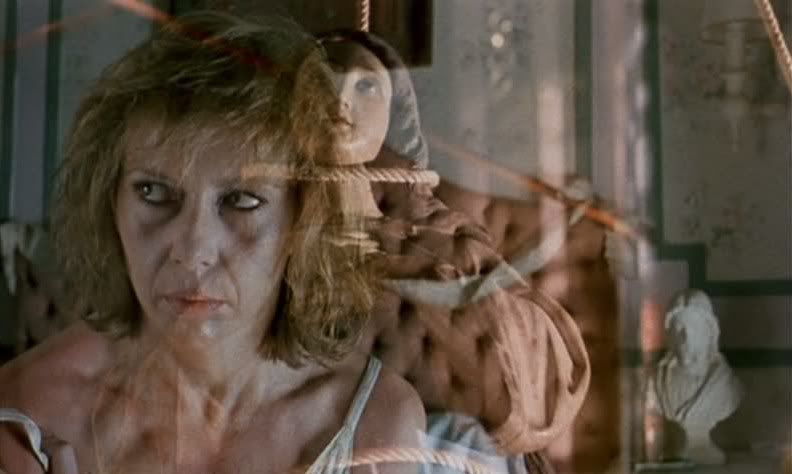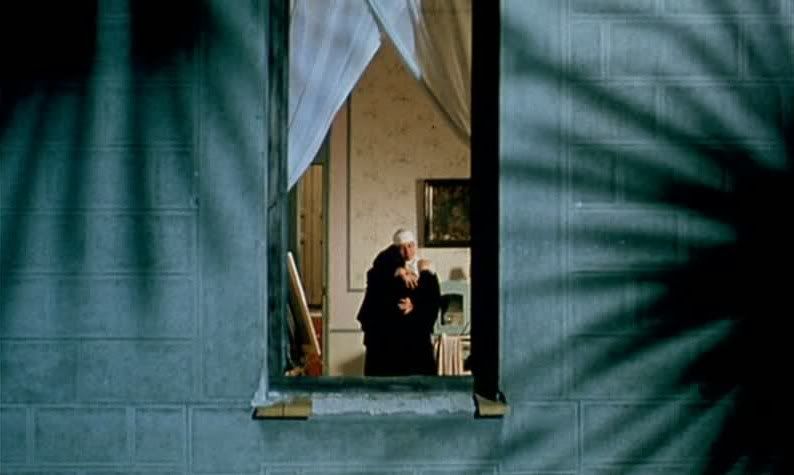
Pedro Almodóvar's fourth feature, Dark Habits, was also his first commercially produced film after a few independent works. The film has a campy, absurdist premise — a nightclub singer hides out from the police at a convent with a group of very strange nuns — that it never quite lives up to. Yolanda (Cristina Sánchez Pascuel) flees when her boyfriend dies from heroin that had been laced with strychnine, and she remembers some nuns who run a refuge for prostitutes and drug addicts. She goes to stay with them but finds that the place is a rather unconventional convent, struggling and in danger of closing, with nuns who all have their personal vices and idiosyncrasies. The Mother Superior (Julieta Serrano) is a lesbian who adores Yolanda and shoots up heroin, plying her new charge with drugs as well. Another nun trips on acid (which Almodóvar represents through point-of-view shots with garish colors). Another secretly writes trashy romance novels, and another raises a full-grown tiger in the yard, playing bongo drums for it and feeding it chunks of raw meat.
With all this weirdness, gay desire and drugs in a convent, it's hard to imagine how Almodóvar managed to make a boring movie, but somehow he did. This is a dull and unevenly acted movie in which Almodóvar seems desperate to be wild and crazy, but the whole thing just plays out as flat. Most of the performances are sadly lacking in charisma, especially Pascuel, who seems to simply drift aimlessly through the film. There's not much of a plot to speak of, either: the convent is in danger of closing, and Yolanda has to hide out, but for most of the movie nothing much happens, and these conflicts are only developed sporadically and lazily. It's a weirdly inert and unsatisfying film that's lacking in the spirited, lively humor that always flows through Almodóvar's best work.
There are scattered enjoyable moments, though, especially centering on the relationship between the Mother Superior and Yolanda, which is hardly developed at all, unfortunately. In two separate scenes, Yolanda sings a song directly to the nun, and Almodóvar switches between closeups of them; the nun's beatific smile and tranquil expression is very moving in these scenes, a lovely expression of desire and contentment. Following the second of these scenes, after Yolanda has performed a song at a convent party, singing directly at the Mother Superior the whole time, the nun gushes to her that she was "so obscene." The nun then lingers in the room a moment while Yolanda, her back turned, strips off her dress, turning and revealing a single bare breast, a shocking moment of sexuality for the lovelorn nun. Even funnier is the blasphemous moment when the nun places a towel over the singer's face, taking an imprint of her like the Turin Shroud; when she pulls the towel away, it is coated with a delicate painting of the singer, a ludicrous secular, and sensual, miracle.

Indeed, the film's final act offers up a few sudden resolutions that are fairly satisfying even if the rest of the film doesn't build up to them in any real way. One of the nuns has been nursing an unspoken desire for the parish priest, and at the end of the film they decide to run away together and forsake their vows, adopting the tiger as their "son" to form a happy nuclear family. The nun compares her love for the priest to the tiger, growing unseen and unsuspected, but dangerous, within the supposedly safe walls of the convent. The final scene, in which the Mother Superior finds out that Yolanda has left and screams in anguish, is also affecting, perhaps because Serrano delivers the best performance in the whole cast. In the final shot, Almodóvar pulls away from the Mother Superior being embraced by another nun, the camera floating out the window to observe the scene from a distance, framed through a window.
Also compelling is a scene where Yolanda, going through drug withdrawal, spends a restless few days haunted by religious images, which Almodóvar superimposes over closeups of a haggard-looking Yolanda. At one point, a statue is being lowered into position with a rope around its neck, like a noose, and it twirls in the air, so that whenever it faces towards the camera its face is juxtaposed with Yolanda's, briefly superimposing the blank, at-peace expression of the religious figure with the tortured face of the drug addict.
Such moments hint at the visual imagination and feel for expressive, bold images that Almodóvar would develop much further in his later work. Even just a few years later he'd be making uneven but undeniably potent camp melodramas like Matador and Law of Desire, but here he still seems tentative. The nuns-doing-drugs-and-having-sex material is curiously restrained for a director who usually has no fear of pushing beyond the boundaries of good taste, and it hurts the film, making it seem as though it wants to hint at offensive content without actually doing much to offend anyone.

1 comment:
Now that sound different. Now I have something to watch.
Post a Comment